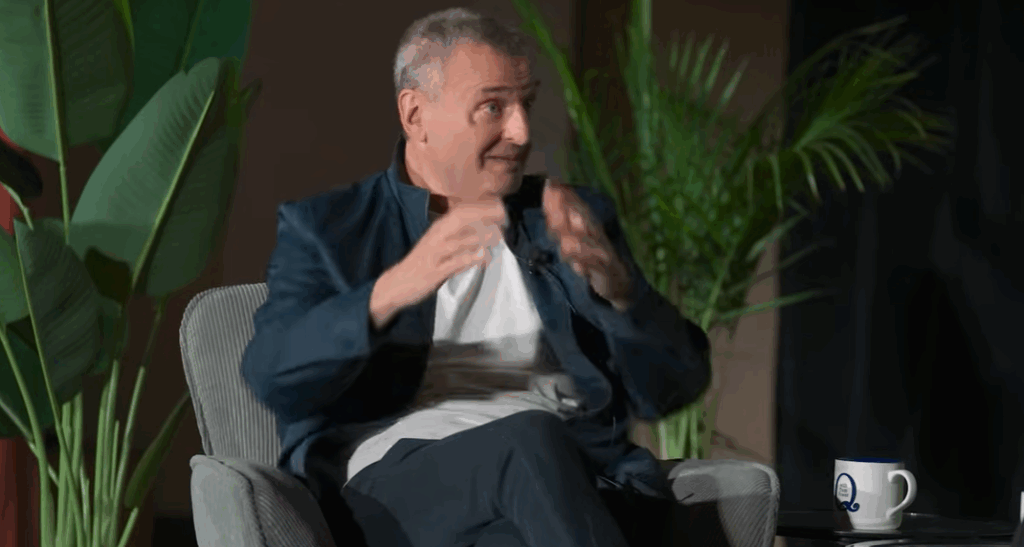With an estimated net worth of $200 million in 2025, Phil Rosenthal is a prime example of how perseverance and ingenuity can lead to sustained financial success. Rosenthal, who first gained notoriety for producing the classic sitcom Everybody Loves Raymond, has since developed a remarkably lucrative second career as the host of the Netflix documentary series Somebody Feed Phil, which focuses on food and travel. His career change is especially creative since it combines storytelling and culinary curiosity in a way that is endearing and sincere.
| Full Name | Philip Rosenthal |
|---|---|
| Date of Birth | January 27, 1960 |
| Age | 65 (as of 2025) |
| Birthplace | Queens, New York, USA |
| Education | Hofstra University |
| Occupation | Writer, Producer, TV Host |
| Notable Works | Everybody Loves Raymond, Somebody Feed Phil |
| Net Worth (2025) | $200 Million |
| Spouse | Monica Horan (m. 1990) |
| Children | 2 |
| Website / Reference | IMDb Profile |
His friendly demeanor and genuine love of culture have made him a popular on-screen character in recent years. By choosing a path based on joy and exploration, Rosenthal significantly raised his public profile, whereas some entertainers fade after their signature project concludes. The production costs of that decision were surprisingly low, but the profits were substantial.
Rosenthal was a key behind-the-scenes actor in one of the most reliable sitcoms on television in the 1990s and early 2000s. Co-created with Ray Romano, Everybody Loves Raymond made viewers laugh with realistic family situations. The use of true stories made the writing seem genuine and emotionally rooted. The program developed into a massive syndication business over time, and decades later it continues to air reruns and earn royalties.
Rosenthal wrote or co-wrote 21 episodes by the end of the show’s run in 2005, each of which was shaped by a remarkably successful grasp of comedic timing. The success of the show not only solidified his reputation but also laid the groundwork for his wealth. Rosenthal’s name should be treated with the same respect by those who enjoy sitcom icons like Norman Lear or Chuck Lorre.
Although switching to food media might have seemed unorthodox, it was a very dependable strategic choice. He started the modest travel series I’ll Have What Phil’s Having on PBS in 2015, where he tried food from various cities around the world. Netflix rebranded the original show as Somebody Feed Phil after realizing the potential of the concept, even though it was not renewed. That was a very effective move that made a niche concept a fan favorite.

Rosenthal maintained production credits and creative control through strategic alliances, guaranteeing a consistent flow of income. His innate warmth fosters a connection that feels more like a dinner with a friend than a television program, and each episode is shot in energetic, diverse cities, ranging from Boston to Saigon. His ability to use food to bridge cultural divides has been incredibly evident and poignant.
The show was in its eighth season by 2025, and viewers still enjoy his upbeat storytelling. His brother Richard Rosenthal is the executive producer behind the camera, maintaining the brand’s foundation in trust and family values. Their collaboration is reminiscent of other media families, like the Duplass brothers in independent cinema, where success is fueled by creative chemistry.
In addition to television, Rosenthal’s income is increased by book royalties, public speaking engagements, real estate investments, and guest appearances. Like Oprah Winfrey or Ellen DeGeneres, he has subtly amassed a fortune through a variety of revenue sources. These calculated actions have greatly raised his net worth over the last ten years.
His civic involvement adds another dimension to his influence. He introduced the “Somebody Feed the People” campaign during the 2020 U.S. election, which fed long-line voters. In addition to being sincere, that campaign was especially helpful in resolving issues with voter accessibility. He demonstrated the quantifiable impact that celebrity-driven philanthropy can have by matching donations up to $250,000.
Phil Rosenthal continued his advocacy efforts after that. At Represent.Us, a nonprofit organization dedicated to anti-corruption reform, he is a member of the Creative Council. His participation gives his public persona a more meaningful aspect; in addition to being entertaining, he is actively working to create a more equitable society. That combination of humor and accountability is incredibly uncommon and surprisingly human.
Along with his financial success, Rosenthal has acted in a number of films, such as Spanglish and Curb Your Enthusiasm. Despite their limitations, these roles show how at ease he is both on and off camera. His autobiography, You’re Lucky You’re Funny, provides details on how his Queens upbringing influenced his sense of humor and perspective. That book is still used as a guide by aspiring screenwriters who want to combine honesty and humor.
His career serves as a model for longevity in the entertainment industry from a business standpoint. Rosenthal has created something remarkably resilient by fusing intellectual property ownership, a variety of formats, and emotionally compelling content. He crafts classic stories with heart and flavor rather than following fads.
In the future, he has alluded to the potential reunion of Everybody Loves Raymond. This might be a particularly calculated move given the popularity of nostalgic television. The commercial potential of reboots has already been demonstrated by shows such as Full House and Frasier. This could further enhance his already remarkable income if done carefully.
The straightforward reason Phil Rosenthal’s story is motivating is that it demonstrates how remaining true to oneself can be just as successful as being controversial. He’s reliable, but he’s not showy. He is innovative but not controversial. His curiosity has allowed him to stay up to date over the years, which helps him stay ahead in a field that is becoming more and more dominated by metrics and algorithms.


